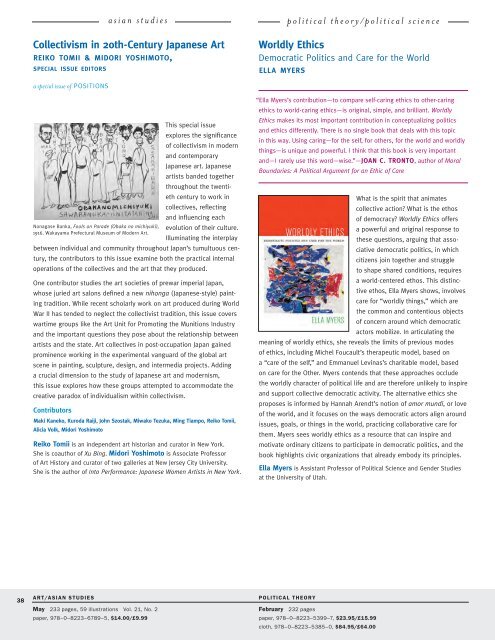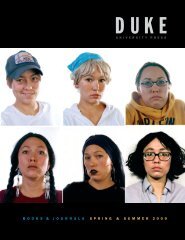Spring 2013 Catalog - Duke University Press
Spring 2013 Catalog - Duke University Press
Spring 2013 Catalog - Duke University Press
Create successful ePaper yourself
Turn your PDF publications into a flip-book with our unique Google optimized e-Paper software.
38<br />
Collectivism in 20th-Century Japanese Art<br />
reiko tomii & midori yoshimoto,<br />
special issue editors<br />
a special issue of POSITIONS<br />
Nonagase Banka, Fools on Parade (Obaka no michiyuki),<br />
1916. Wakayama Prefectural Museum of Modern Art.<br />
This special issue<br />
explores the significance<br />
of collectivism in modern<br />
and contemporary<br />
Japanese art. Japanese<br />
artists banded together<br />
throughout the twenti-<br />
eth century to work in<br />
collectives, reflecting<br />
and influencing each<br />
evolution of their culture.<br />
Illuminating the interplay<br />
between individual and community throughout Japan’s tumultuous cen-<br />
tury, the contributors to this issue examine both the practical internal<br />
operations of the collectives and the art that they produced.<br />
One contributor studies the art societies of prewar imperial Japan,<br />
whose juried art salons defined a new nihonga (Japanese-style) paint-<br />
ing tradition. While recent scholarly work on art produced during World<br />
War II has tended to neglect the collectivist tradition, this issue covers<br />
wartime groups like the Art Unit for Promoting the Munitions Industry<br />
and the important questions they pose about the relationship between<br />
artists and the state. Art collectives in post-occupation Japan gained<br />
prominence working in the experimental vanguard of the global art<br />
scene in painting, sculpture, design, and intermedia projects. Adding<br />
a crucial dimension to the study of Japanese art and modernism,<br />
this issue explores how these groups attempted to accommodate the<br />
creative paradox of individualism within collectivism.<br />
Contributors<br />
Maki Kaneko, Kuroda Raiji, John Szostak, Miwako Tezuka, Ming Tiampo, Reiko Tomii,<br />
Alicia Volk, Midori Yoshimoto<br />
Reiko Tomii is an independent art historian and curator in New York.<br />
She is coauthor of Xu Bing. Midori Yoshimoto is Associate Professor<br />
of Art History and curator of two galleries at New Jersey City <strong>University</strong>.<br />
She is the author of Into Performance: Japanese Women Artists in New York.<br />
ART/ASIAN STUDIES<br />
May 233 pages, 59 illustrations Vol. 21, No. 2<br />
paper, 978–0–8223–6789–5, $14.00/£9.99<br />
asian studies political theory/political science<br />
Worldly Ethics<br />
Democratic Politics and Care for the World<br />
ella myers<br />
“Ella Myers’s contribution—to compare self-caring ethics to other-caring<br />
ethics to world-caring ethics—is original, simple, and brilliant. Worldly<br />
Ethics makes its most important contribution in conceptualizing politics<br />
and ethics differently. There is no single book that deals with this topic<br />
in this way. Using caring—for the self, for others, for the world and worldly<br />
things—is unique and powerful. I think that this book is very important<br />
and—I rarely use this word—wise.”—JOAN C. TRONTO, author of Moral<br />
Boundaries: A Political Argument for an Ethic of Care<br />
What is the spirit that animates<br />
collective action? What is the ethos<br />
of democracy? Worldly Ethics offers<br />
a powerful and original response to<br />
these questions, arguing that associative<br />
democratic politics, in which<br />
citizens join together and struggle<br />
to shape shared conditions, requires<br />
a world-centered ethos. This distinctive<br />
ethos, Ella Myers shows, involves<br />
care for “worldly things,” which are<br />
the common and contentious objects<br />
of concern around which democratic<br />
actors mobilize. In articulating the<br />
meaning of worldly ethics, she reveals the limits of previous modes<br />
of ethics, including Michel Foucault’s therapeutic model, based on<br />
a “care of the self,” and Emmanuel Levinas’s charitable model, based<br />
on care for the Other. Myers contends that these approaches occlude<br />
the worldly character of political life and are therefore unlikely to inspire<br />
and support collective democratic activity. The alternative ethics she<br />
proposes is informed by Hannah Arendt’s notion of amor mundi, or love<br />
of the world, and it focuses on the ways democratic actors align around<br />
issues, goals, or things in the world, practicing collaborative care for<br />
them. Myers sees worldly ethics as a resource that can inspire and<br />
motivate ordinary citizens to participate in democratic politics, and the<br />
book highlights civic organizations that already embody its principles.<br />
Ella Myers is Assistant Professor of Political Science and Gender Studies<br />
at the <strong>University</strong> of Utah.<br />
POLITICAL THEORY<br />
February 232 pages<br />
paper, 978–0–8223–5399–7, $23.95/£15.99<br />
cloth, 978–0–8223–5385–0, $84.95/£64.00












